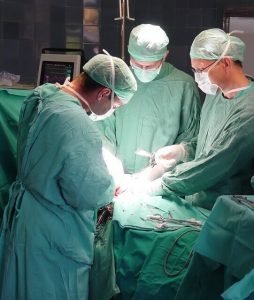
Free Consultation(203) 447-0000

Free Consultation(203) 447-0000
 While any surgery poses certain risks, hospitals are required to take as many precautions as possible to prevent postoperative infections. Research shows that surgery patients have a one to three percent chance of contracting an infection during or after their procedure. Modern medical protocols are generally successful in preventing these infections; however, when an infection results from a medical professional ignoring these safety protocols or committing other acts of negligence, legal action may be justified.
While any surgery poses certain risks, hospitals are required to take as many precautions as possible to prevent postoperative infections. Research shows that surgery patients have a one to three percent chance of contracting an infection during or after their procedure. Modern medical protocols are generally successful in preventing these infections; however, when an infection results from a medical professional ignoring these safety protocols or committing other acts of negligence, legal action may be justified.
Serious cases of MRSA and other staph infections can be extremely difficult to control. Patients forced into quarantine may incur significant medical expenses and miss substantial time from work. Surgeons should be intimately aware of the risks of all types of post-surgical infections and the hospital protocols for preventing them.
When a bacteria called Staphylococcus to invade an open wound, it attacks the body’s cells. This wound can be as small as a simple cut or, in hospital situations, a recovering surgical incision. There are a variety of staph bacteria, including easily treatable, benign strains, as well as dangerous, flesh-eating kinds. Certain strains have become resistant to commonly used antibiotics, often resulting in long and difficult recoveries.
Though many people tend to think MRSA and staph are two separate kinds of infections, MRSA is a strain of the Staphylococcus bacteria. MRSA, or Methicillin-Resistant Staphylococcus Aureus, is one of the antibiotic-resistant mutations of staph that is more difficult to treat. Severity ranges from mild sores or boils to sepsis in the bloodstream, lung infections, and urinary tract infections. MRSA has been dubbed a “superbug” in the medical field, due to its difficulty to control.
The Committee to Reduce Infection Deaths (RID) reports that the number of fatalities from hospital infections is larger than the number of deaths resulting from car accidents, breast cancer, and AIDS combined. Approximately two million hospital patients become ill from these infections annually.
Some of the most obvious, yet vital, defenses against these invasive infections include basic sanitary measures, such as hand-washing. Other sanitary measures include ensuring that sheets and bandages are changed daily, that equipment is sterilized, and that medical staff wears scrubs when necessary.
The fact that so many post-surgical infections are preventable makes hospitals, physicians, and other medical professionals increasingly vulnerable to malpractice claims. Two of the most common types of medical malpractice claims arising out of post-surgical infections include:
Recovering from an unnecessary infection after surgery can be financially and emotionally exhausting. Staph infections can cause complications that affect you for the rest of your life. At Berkowitz and Hanna LLC, we have extensive experience protecting the rights of clients and their families. Our experienced malpractice attorneys understand the challenges of malpractice claims, and we have an impressive record of obtaining compensation for our clients. If you believe you may be a victim of medical malpractice, contact us today for a free consultation.
Berkowitz Hanna
